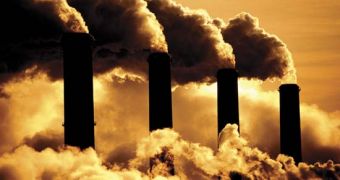A new report issued by the Energy Information Administration in the United States this past Monday says that, when compared to the year 2012, the amount of carbon emissions that the country's energy sector produced in 2013 is roughly 2% greater.
However, the organization wishes to stress the fact that, despite this increase, the United States’ energy-related carbon footprint is still smaller than it was just a few years ago.
More precisely, the Administration argues that, when a 2005 baseline is taken into consideration, carbon emissions documented in 2013 are some 10% smaller.
Hence, the country has high chances to meet its goal of reducing this type of air pollution by at least 17% when compared to 2005 by the end of this decade.
“Emissions in 2013 are slightly more than 10% below 2005 levels, a significant contribution towards the goal of a 17% reduction in emissions from the 2005 level by 2020 that was adopted by the current Administration,” the Energy Information Administration writes in a press release.
“This level of reduction is expected to continue through 2015,” the organization goes on to add.
Thus, experts predict that, in 2014, the use of both hydropower and non-hydropower for electricity and heat generation will up by approximately 3%. In 2015, the use of said energy sources is likely to increase at a rate of 4.7%.
Specialists working with the Administration explain that, according to their investigations into the matter at hand, the United States owes its 2013 increase in its carbon emissions to the fact that the country's electric power industry smarted using a tad more coal than it usually did.
As detailed on the organization's website, “Once all data are in, energy-related carbon dioxide (CO2) emissions in 2013 are expected to be roughly 2 percent above the 2012 level, largely because of a small increase in coal consumption in the electric power sector.”
Furthermore, “Coal has regained some market share from natural gas since a low in April 2012. However, the impact on overall emissions trends remains fairly small.”

 14 DAY TRIAL //
14 DAY TRIAL //